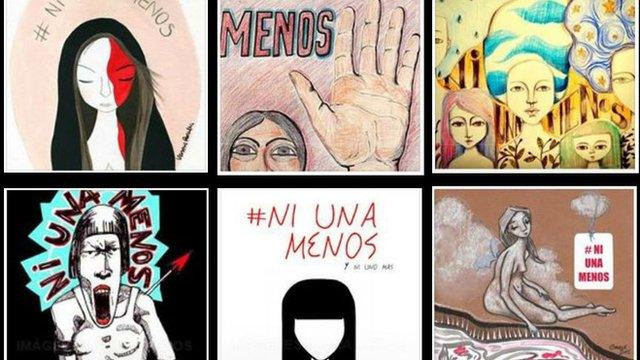Argentine women hit back at violence
- Published
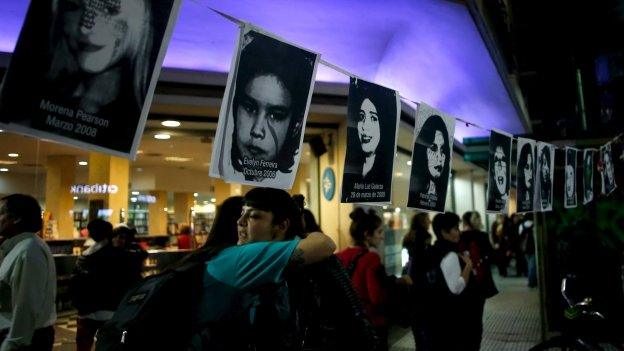
The Buenos Aires demonstration seems to have created real impact
Street protests are common in Latin America and, as an Argentine journalist, covering them has become somewhat routine.
But the massive demonstration on 3 June calling for an end to gender-based violence was a completely new experience for me.
For the first time, I found myself torn between the journalist who had to cover the event as an impartial witness, and the woman who felt compelled to join the protest.
Never had I witnessed such a massive outcry against something that has always been a part of my culture: machismo.
Tens of thousands of people (most of them women, but many men too) took to the streets to demand an end to violence against women, and in particular femicides, the killing of women because of their gender.
They were called into action by a group of female journalists who organised the rally after hearing about the death of a 14-year-old girl murdered because she was pregnant.
The slaying of Chiara Paez, external - reportedly buried alive- was the latest in a long line of female casualties.
"Aren't we going to raise our voice? THEY ARE KILLING US", tweeted journalist Marcela Ojeda.
That outburst quickly turned into a rallying cry: #NiUnaMenos, external (Not One Less), which spread through social media like wildfire and would eventually spur the biggest anti-machismo street protest in the history of Argentina.
Land of Evita
The size of the march - more than 150,000 gathered in the capital alone - surprised outside viewers who hadn't perceived male chauvinism to be such a big issue in Argentina.
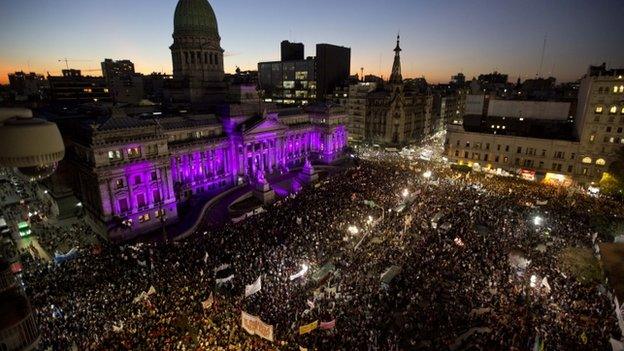
Some were surprised by the size of the demonstration
After all, the country has a female president, Cristina Fernandez de Kirchner, and a history of strong female leaders such as the famous first lady Eva Peron, who fought for women's rights , externalin the 1950s and whose fiery personality inspired the musical Evita.
After the march both the Argentine Supreme Court and the Human Rights Secretariat announced the creation of registries to collect data on violence against women. Data should be available by the end of the year.
But many have asked whether Argentina has a worse problem than the rest of Latin America?
The truth is no-one knows for sure.
As in most Latin American countries, there are no official statistics on femicides.
Unofficial figures suggest that Argentina has nothing like the problem faced by countries like El Salvador and Mexico, where women are killed daily.
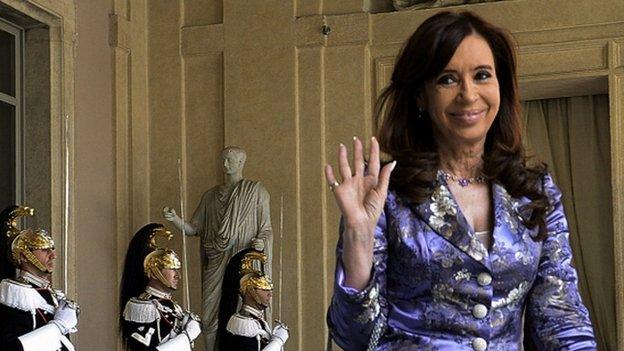
Cristina Fernandez de Kirchner leads the country
Yet, the number of gender-related deaths is still staggering.
La Casa del Encuentro, external, a women's shelter that carries out the only national estimate on femicides, calculates that a woman is killed every 31 hours.
More than 1,800 women have been shot, stabbed, beaten, burned, strangled or drowned to death since 2008, when the records began.
The number of slayings led to Congress passing a bill in 2012 which increases jail terms in cases of gender-related violence.
The piropo
What makes femicides different to other violent crimes is that in most cases the killer is the husband, boyfriend or former partner of the victim.
This is one of the issues that was addressed by the protest - a gathering whose ultimate aim is to precipitate real social change.
Many Argentines feel that male-on-female violence stems from a larger cultural environment that sees women as objects.

Eva Peron and women's rights:
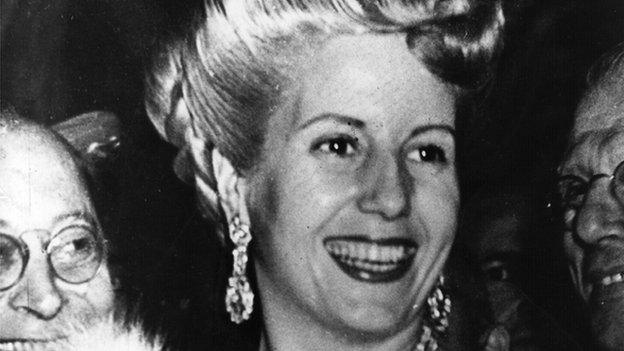
Eva Peron: A glamorous figure who campaigned for women's rights
The second wife of Argentine President Juan Peron is credited with playing a significant role in gaining the right to vote for Argentine women.
She made radio addresses in support of women's suffrage, and also published articles on the subject in her Democracia newspaper.
A women's suffrage bill was sanctioned by the Senate of Argentina in 1946, and made it into law a year later.
Eva Perón then created the Female Peronist Party, the first large female political party in the nation. It is thought this was key in Juan's Peron's landslide win in the 1951 presidential elections.

An example of this is the piropo, a compliment or flirtatious remark made by men to women on the street.
While many men defend this typically Latin American tradition as a form of gallantry, younger women are increasingly expressing their disgust at being made the centre of unwanted male attention.
"The way I dress is not an invitation for your comment," read a sign carried by one of the female protesters at the march.
Last year, Buenos Aires mayor Mauricio Macri, a current presidential candidate, caused a controversy, external after claiming that "deep down all women like piropos, even if they include a rude comment".
His comment, and the debate that followed, showed the enormous gap in Argentine society between traditional and more modern views on male-female interactions.
An even clearer example of Argentina's objectification of women can be seen daily on TV.
The country's most popular programme, the local version of Strictly Come Dancing, features famous female stars wearing very few clothes and dancing sensually.
While most Argentines still consider this normal, more and more women - especially young women - are demanding change.
- Published4 June 2015
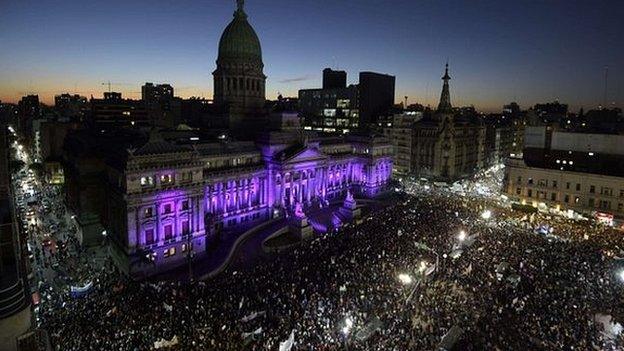
- Published3 June 2015
